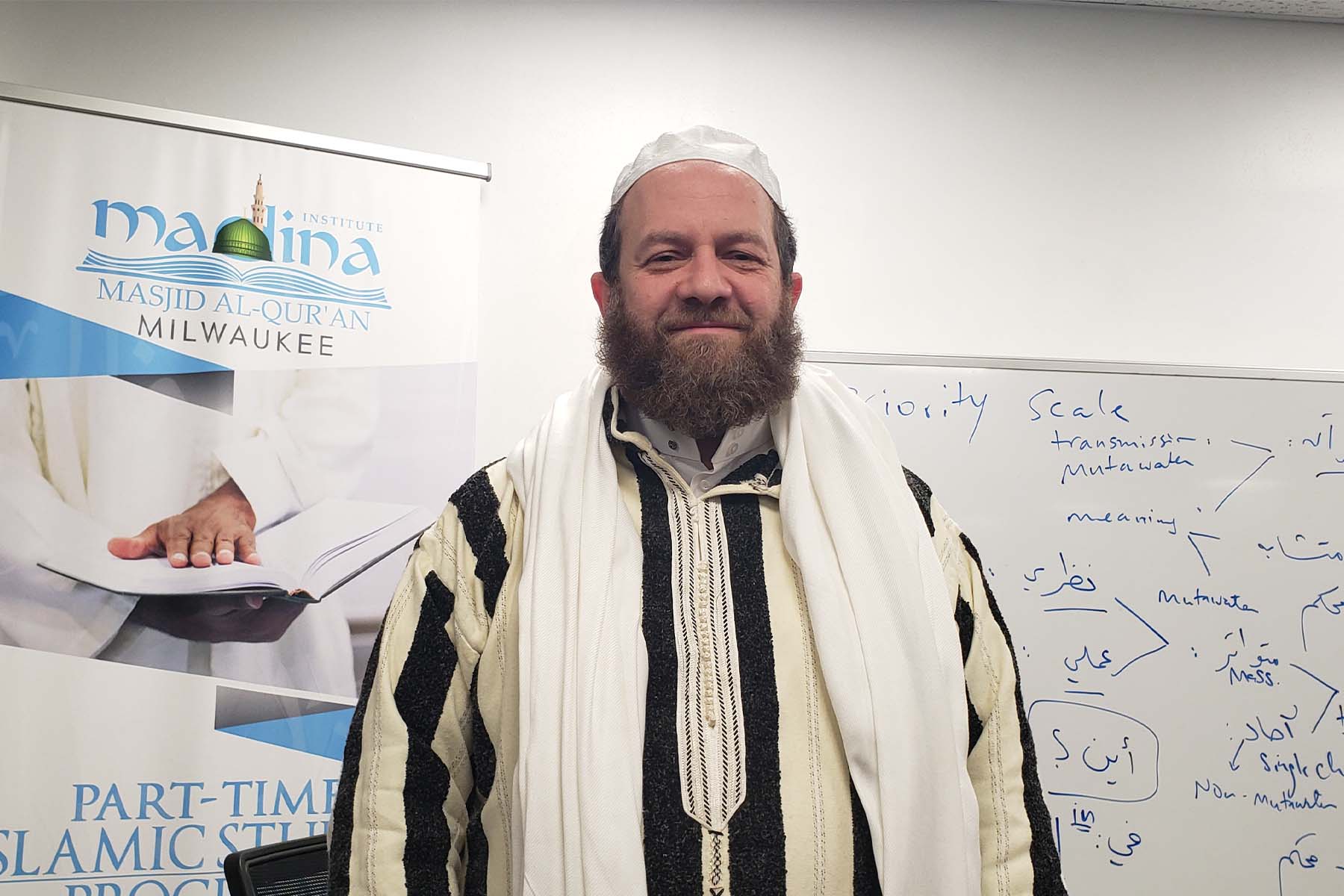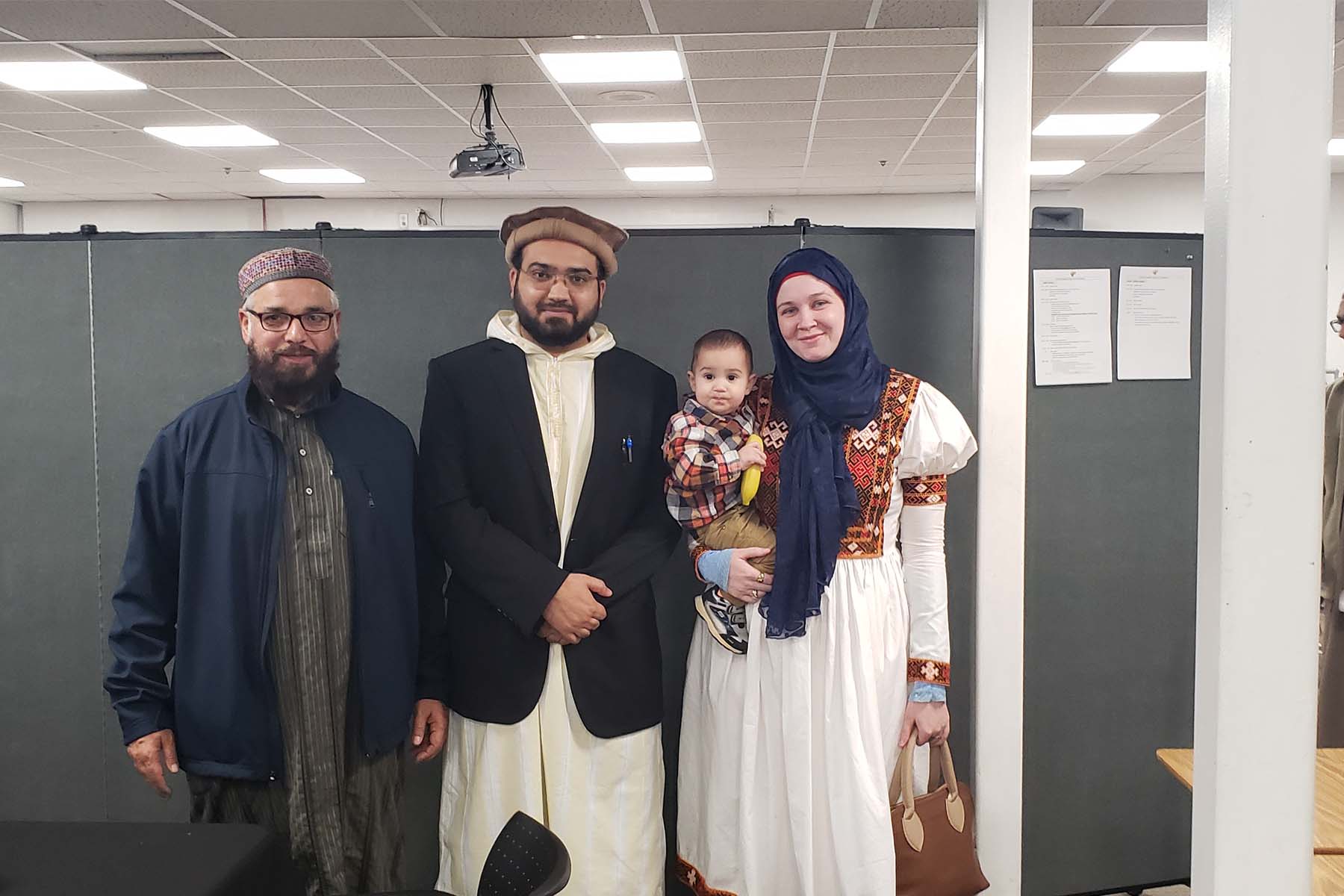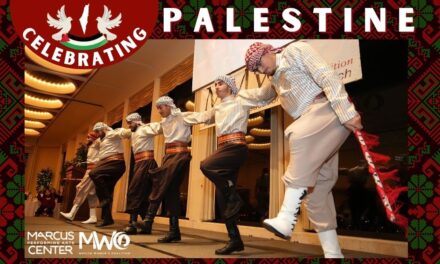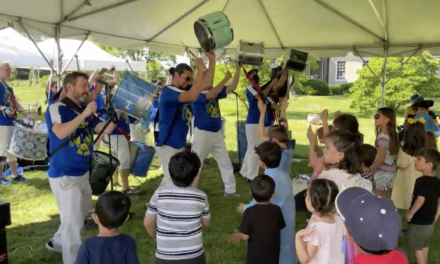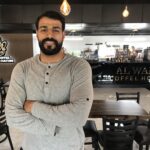A group of about thirty students sits at long tables in a sectioned-off area of the basement at Masjid Al-Qur’an on Brown Deer Road. A man in a green kufi reads a text into a microphone. Sitting in front of the room in a striped thob is Shaykh Muhammad al-Ninowy, founder and director of Madina Institute, an Islamic seminary in Atlanta, Georgia. He regularly interrupts the reader to comment on the text.
Though the students have been in this room since 10:00 a.m. and it is now late afternoon, they still seem fresh, alert, and eager to learn.
This is Sunday, December 1, day 2 of the second module of a course on Islam that has only been offered in Milwaukee since September 2018. The 10-module class meets one weekend per month, and students come from all walks of life and many different Muslim congregations.
In fact, according to Hafiz Muhammad Shafique, imam of Masjid Al-Qur’an, attendees have come from Iowa, Illinois, and Minnesota to take the course in Milwaukee, one of only 3 cities in the U.S. that currently offers it.
Today, Shaykh Ninowy discusses The Attributes of God (Daf’ Shubah al-Tashbīh bi-Akaff al-Tanzīh) by Ibn al-Jawzi, a book of hadith.
Hadith, as Ninowy explained later by phone, refers to those “Prophetic sayings that have been recorded. These statements have been uttered by the Prophet (p) himself.” Ninoy emphasizes that in studying hadith, “there is a scientific methodology” for “authentication” of statements attributed to the Prophet (p).
The course examines “the chain of narrators” who claim to have direct knowledge of the Prophet’s (p) words, and calls attention to “people who have questionable characters or are proven liars or forgers. When I see something that’s attributed to the Prophet (p) that is inconsistent with the scripture,” said Ninowy, “there’s a problem with the transmission mode of these statements.”
The Attributes of God is an 800-year-old text in which Ibn al-Jawzi “is negotiating certain aspects and views of what God is and who God is. Is he matter, energy, or light? No. He is the creator of all that,” Ninowy said. “The creator cannot be subject to the laws of physics.” Sometimes we, “look at what the creator made” and call it God, Ninowy said, But God “could not be part of creation because [God] existed prior to all that.”
Ninowy said the Madina Institute’s courses are a “back-to-basics approach,” to studying Islam. “which means going back to the scriptures in the Qur’an and the authentic Prophetic statements.” In studying hadith, students read the source materials “rather than possible interpretations of the source” asking what the source actually said instead of relying on the interpretations of generations of commentators. This is the process of interrogation Ninowy and his students have been undertaking this weekend.
The opportunity to take the course in Milwaukee came about because of Iman Shafique’s daughter, Aiman Shafiq, and her quest for a more in-depth knowledge of her religion.
Aiman graduated from DS/HA, where she attended required classes on Catholicism for four years and found herself wanting to study her own religion in a similarly formal way. As an imam’s daughter, she was well-versed in the daily practice of Islam, “but you’re raised on the religion so you don’t have a chance to really study it.” She wanted to study Aqeedah, Islamic theology.
“Religion is a big part of forging an identity,” Aiman said. “You go to masjid and they tell you how to do things, and that’s fine, but . . . I now have a foundational understanding” of Islam.
Many Muslims, she said, live within “a preacher culture. A lot of people just listen to talks. We don’t study [Islam] for ourselves, but Islam is not just for scholars. The common man should be able to read the Qur’an and have an understanding.” The Madina program’s back-to-basics approach has, she said, given her “the tools, the intellectual capacity to study the religion on my own.”
Now a student at UW-Madison majoring in neuro-biology, she has no regrets that she took a year off to “do something so spiritual.”
Neither does her father. The family researched other Islamic institutes, including several in the Chicago area, before choosing Madina’s intensive one-year course, offered only in Atlanta. “After she graduated,” Hafiz Shafique said, “I got more confidence because of the level of knowledge she gained” at Madina Institute. “That caused me to request of Shayk if we can start something like that in Milwaukee.”
The result was the one-weekend-per-month, 10-module course now being offered, which is taught by Ninowy as well as other faculty members from the Madina Institute.
One of the important features of the Madina program is its emphasis on Arabic, Aiman said. In fact, during the one-year intensive course, students studied Arabic four hours per day. Shaykh Ninowy’s approach, Aiman said, creates a “rigorous academic environment where he and the other scholars are presenting things to you and you are going to pick it up and form your own beliefs. In fact, if you’re just blindly following the ideology – you’re not in the right place.”
Aiman Shafiq now attends the part-time course in Milwaukee whenever she has time.
On Sunday, while sleet and snow collected outside, students had the opportunity to develop a clear understanding of the attributes of God under the guidance of a respected Islamic scholar. “The scripture is one thing and that’s agreed upon, but what people say the Prophet (p) said needs to be subject to scrutiny and identification,” Shaykh Ninowy said.
“The problem is never with religions,” Ninowy said. “The problem is with those who interpret religions. No religion comes to discriminate or to promote hate or violence or exclusion, it’s people who claim to be religious who do, and therefore it’s imperative that we separate claims from facts, substance from suspicion. Back to basics means to cut the middle-man” and get back to what the Prophet (p) authentically said.
